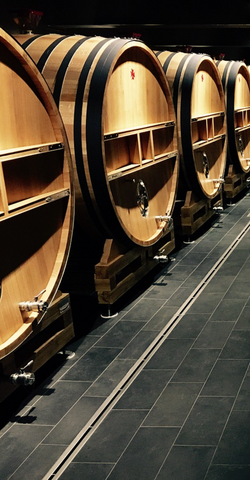Rich Oaky white wines are full-bodied, concentrated and generally have low to medium acidity and high alcohol. They are almost always made in contact with oak either during fermentation and/or afterwards through ageing in oak casks. This oak contact is very significant as it gives additional flavour dimensions to the wine, as well as adding complexity. Expect these wines to have a creamy mouthfeel with luscious flavours of butter and honey combined with melon, pear and tropical fruits such as nectarines and pineapple. Add to this vanilla, toast and nutty flavours contributed by the oak and you have rich, full-bodied wines of real character and often with great complexity.
 1. Oak-aged Sauvignon Blanc first became widely popular in the 1980s when Californian winemaker Robert Mondavi coined the name, Fumé Blanc.
1. Oak-aged Sauvignon Blanc first became widely popular in the 1980s when Californian winemaker Robert Mondavi coined the name, Fumé Blanc.2. Fumé Blancs tended to taste heavily oaky, full-bodied and dry – very appealing in the bigger-is-better style of the 1980s.
3. Oak can be used in two ways in Sauvignon Blanc – as a fermentation vessel and as a maturation vessel; both add flavour, body, and softness.
4. Oak has traditionally been used both for fermentation and aging wine in Bordeaux and the Loire Valley in France – in both dry and sweet wines.
5. The most famous sweet wines aged in oak come from Bordeaux and tend to be high quality with a high degree of botrytis influence (ie, very sweet) and high price tags to match.
6. Top-quality dry wines made from Bordeaux in south-west France tend to be a blend of Sauvignon Blanc and Semillon, both fermented and matured in oak.
7. The best example of New Zealand wines that emulate this style is Dog Point Vineyards Section 94 (100% Sauvignon, 100% new oak), Pegasus Bay Sauvignon Semillon (70%/30% Sauvignon / Semillon, all old oak) and Te Mata Cape Crest (95% Sauvignon with a little Semillon and Sauvignon Gris).
8. Oak can be used subtly to add body and softness without tasting excessively oaky.
9. Too much oak can make wines taste astringent, white, or red, regardless of the grape varieties used.

Joelle Thomson is a wine writer, journalist and author. She’s an avid lover of wine and currently writes for Capital magazine, Good magazine, NZ Winegrower, Drinksbiz, and her own site, www.joellethomson.com



